VISE rocks SPIE Medical Imaging Conference racking up five student awards
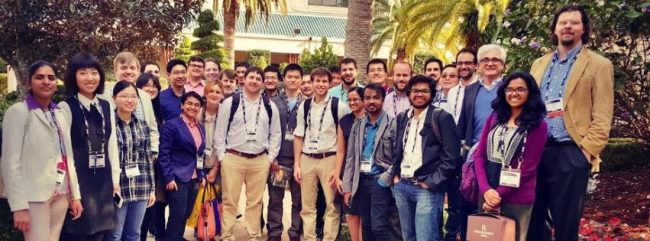
Twenty-five students from five laboratories affiliated with the Vanderbilt Institute in Surgery and Engineering (VISE) attended the SPIE Medical Imaging 2017 Conference in mid-February. Five Vanderbilt students across Computer Science, Electrical Engineering, and Biomedical Engineering were selected for scientific awards out of almost 450 papers presented this year.
The week-long conference showcases cutting edge-research, world-class speakers, technical events, education, and networking. The symposium focuses on a range of medical imaging modalities including acquisition, display, processing, analysis, perception, and decision support.
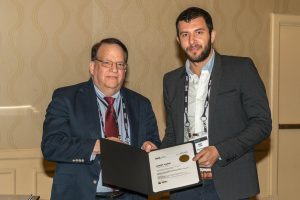
Ahmet Cakir was named first runner up in the Robert F. Wagner All-Conference Student Paper Award, for “Evaluation of a high-resolution patient-specific model of the electrically stimulated cochlea.”
Cakir uses patient CT image data to create patient-specific electro-anatomical models of the electrically stimulated cochlea and optimized these models to better match intra-cochlear voltage distributions measured from coclear implant recipients. The results showed that the electro-anatomical models were able to simulate the measured intra-cochlear voltage distributions with an average error of 10 percent.
“This conference has been integral to my doctoral training. It’s great for networking, presenting, and receiving feedback from other researchers across the world. When I discovered I had won runner-up for the Robert F. Wagner Award, I was very honored,” Cakir said. “It feels great to be acknowledged for the work you’re doing, but honestly it more so reminded me that my work really means something to others as well.”
Cakir works under the supervision of Jack Noble, research assistant professor of electrical engineering and computer science. They are both members of the Medical Imaging Lab (MIP) led by Benoit Dawant, Cornelius Vanderbilt Professor of Engineering and VISE Center Director.
“The VISE research groups were very well-represented at the SPIE conference, which is the largest annual international conference on medical imaging. The conference provides a great opportunity to see the latest and greatest from research groups around the world and for students to showcase their work and receive critical feedback,” Nobel said.
“It was very exciting and gratifying to see Ahmet’s work be recognized, and all of the student awards were well deserved and show the high quality of work presented by VISE graduate students,” Noble said.
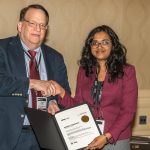
Shikha Chaganti was a finalist for the Robert F. Wagner All-Conference Best Student Paper Award for her paper, “Phenotype analysis of early risk factors from electronic medical records improves image-derived diagnostic classifiers for optic nerve pathology.”
Justin Paul was a finalist for the Robert F. Wagner All-Conference Best Student Paper Award for his paper, “Deep learning for brain tumor classification.”
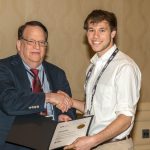
Both Chaganti and Paul work in the Medical Imaging and Statistical Interpretation (MASI) lab with director Bennett Landman, associate professor of electrical engineering, computer engineering and computer science. “I’m thrilled with the recognition Shikha and Justin received for their papers combining medical imaging and big data. These conference papers are just the beginning of exciting lines of research,” Landman said.
“The SPIE Medical Imaging conference is an excellent opportunity for students to participate in international research community. I am enthusiastic about our growing involvement in this conference to build on Vanderbilt’s history of success and involvement with the SPIE community,” said Landman, also associate professor of biomedical engineering, radiology and radiological sciences.
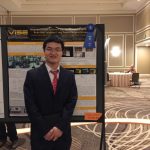 Xiaochen Yang was the cum laude winner in the Image-Guided Procedures, Robotic Interventions, Modeling conference for his poster, “Integrated system for point cloud reconstruction and simulated brain shift validation using tracked surgical microscope.” He works with both Dawant and Michael Miga, Harvie Branscomb Professor of Biomedical Engineering and director of the Biomedical Modeling Laboratory.
Xiaochen Yang was the cum laude winner in the Image-Guided Procedures, Robotic Interventions, Modeling conference for his poster, “Integrated system for point cloud reconstruction and simulated brain shift validation using tracked surgical microscope.” He works with both Dawant and Michael Miga, Harvie Branscomb Professor of Biomedical Engineering and director of the Biomedical Modeling Laboratory.
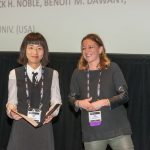 Jianing Wang was awarded Honorable Mention in the poster competition for her poster, “Automatic selection of landmarks in T1-weighted head MRI with regression forests for image registration initialization.” She works with Dawant in the MIP laboratory.
Jianing Wang was awarded Honorable Mention in the poster competition for her poster, “Automatic selection of landmarks in T1-weighted head MRI with regression forests for image registration initialization.” She works with Dawant in the MIP laboratory.

